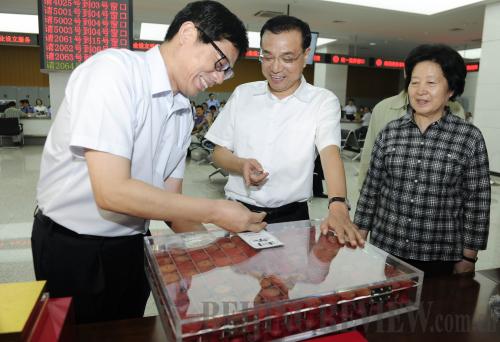|
 |
|
IN THE MAKING: Chinese Premier Li Keqiang (center) witnesses the process of 109 official seals being put to disuse in Tianjin Binhai New District on September 11, 2014 (LIU ZHEN) |
As the old saying goes, time is money. That is especially true in the business world, where even a small temporal delay may cost millions of dollars. Tedious approval procedures cost time and therefore threaten businesses' viability.
To this end, when Chinese Premier Li Keqiang took office in March 2013, he promised that streamlining government administration would be on top of the reform agenda. He pledged to cancel or decentralize over one third of the approval items in the State Council, China's cabinet, within his tenure.
Over the past two years, the Chinese Government has made great efforts to ease market maneuverability by reducing the amount of administrative approvals required for businesses. Less administrative approvals also entail simpler procedures, take a shorter time to be processed and involve more transparency.
"Market dynamics are beyond your imagination. Therefore, the government must uphold the transformation of its functions by streamlining administrative approval, so as to give full play to the 'unimaginable' power of the market," Premier Li said during an inspection tour to Shenyang, northeast China's Liaoning Province, in March 2014.
A self-inflicted reform
Over the past two years, the Chinese Government has massively cut down on red tape and lessened intervention in the market, aiming to give it a decisive role in allocating resources, as outlined by the Third Plenary Session of the 18th Central Committee of the Communist Party of China (CPC) held in November 2013.
When delivering the government work report to lawmakers at the Third Session of the 12th National People's Congress (NPC) on March 5, Premier Li announced that the government has met its goal ahead of schedule. At last year's NPC session, the premier disclosed that the State Council plans to cancel or decentralize over 200 more administrative approval procedures by the end of 2014 to unleash more market dynamics.
Decentralizing administrative powers has also been a point of focus among participants at China's annual sessions of the NPC and the National Committee of the Chinese People's Political Consultative Conference (CPPCC), the country's top political advisory body, during the past two years.
According to Xinhua News Agency, as of the end of 2014, 798 administrative approval items had been canceled or delegated to lower-level governments, more than one third of the total approval items in effect in March 2013.
Throughout 2014, Li presided over 40 executive meetings of the State Council, 21 of which explicitly focused on streamlining government administration. In all, a total of 247 approval items were canceled or decentralized, including those in key areas such as innovation, startups, business management and increasing employment rates.
"The government used to intervene too much with microbusiness operations. That would greatly twist the relationship between the government and the market, seriously undermine market vitality and cause corruption. Since Premier Li assumed office in March 2013, his administration has accelerated the transformation of government functions by streamlining administrative approvals. The quicker the pace is, the more vitality the market will have. As a result, more intrinsic growth momentum will be created," said Chi Fulin, President of the China Institute for Reform and Development (CIRD) in south China's Hainan Province.
Liu Junhai, Director of the Business Law Center at the Beijing-based Renmin University of China, said streamlining administrative approval will increase the credibility of the government and unleash the untapped power of the market.
"The government is stepping back to judge the game while letting businesses play," Liu elaborated.
Xin Ming, an economics professor at the Party School of the CPC Central Committee, said that streamlining administration can help combat corruption.
"Too many administrative approvals will not only reduce market vitality but also raise corruption. By canceling unnecessary approvals, government power is less likely to be abused. It will create a more open and transparent market environment," Xin said.
In a bid to boost entrepreneurship, the State Administration for Industry and Commerce (SAIC) lifted restrictions on minimum registered capital, payment deadlines, and the down payment and cash ratios for registered capital on March 1, 2014, a move also aimed at energizing the economy.
| 